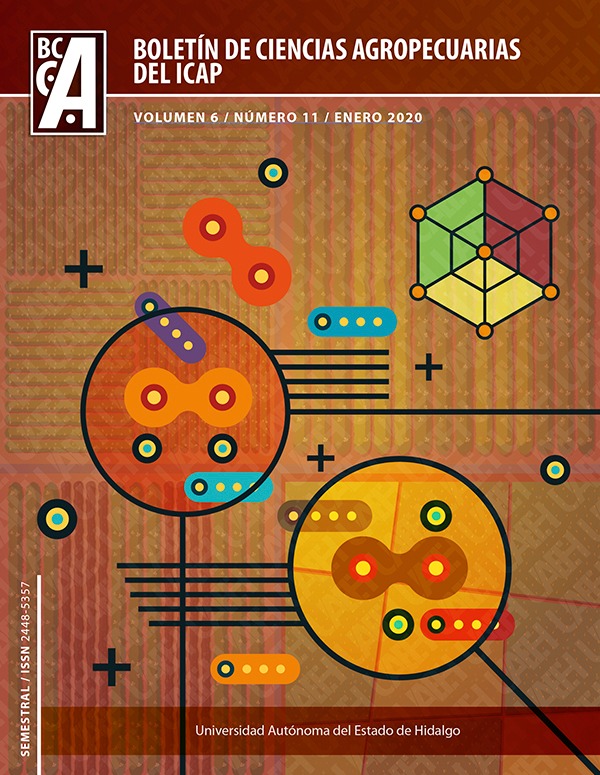Caracterización térmica y estructural del bagazo de Oca
DOI:
https://doi.org/10.29057/icap.v6i11.5327Palabras clave:
Esterificacion, oca y bagazoResumen
Se realizó la caracterización estructural y térmica del bagazo de Oca, donde a través de las imágenes de microscopía electrónica de barrido sé muestra que los gránulos de almidón presentes en el bagazo, aparentemente no sufrieron un daño estructural, sin embargo, si se observaron concavidades en la superficie de los gránulos. La muestra de bagazo, tanto nativo como modificado, mostró un patrón de difracción tipo B, que es característico de los tubérculos. En el bagazo modificado, se observó un nuevo pico a 1727 cm-1. Mientras los resultados de calorimetría mostraron una disminución del pico endotérmico. Sin embargo, se requiere una investigación adicional para explorar las aplicaciones y la funcionalidad de los bagazos, para potencializar su uso en la industria alimentaria.
Descargas
Citas
Anastassiadis, S., Morgonov, L., Kamzolova, S., & Finogenova, T. (2008). Citric acid production patent review. Recent Patents on Biotechnology, 2(2), 107-123.
Chen, W., Zhou, H., Yang , H., & Cui, M. (2015). Effects of charge-carrying amino acids on the gelatinization an retrodegratation properties of potato starch. Food Chemistry, 180-184.
Hernández, J., Gacía , F., Gutiérrez, F., Rodríguez, S., & Bello, L. (2014). By-products derived of the starch isolation from tubers: Physicochemical and functional properties. Journal of Food, Agriculture & Environment, 12 (1), 43-46.
Jiménez, H. S. (2007). Physical, chemical and microscopic characterization of a new starch from chayote (Sechium edule) tuber and its comparison with potato and maize starches. Carbohydrate Polymers, 68, 679-689.
Liu, R. L. (2014). The effect of high moisture heat-acid treatment on the structure and digestion property of normal maize starch. Food Chemistry, 159, 212-222.
Mei, J., Zhou , D., Jin, Z., Xu, X., & Chen, H. (2015). Effects of citric acid esterification on digestibility, structural and physicochemical properties of cassava starch. Journal Food Chemistry, 187, 378-384.
Moo, V., Cabrera, M., Estrada, R., Ríos, C., Betancur, D., Chel, L., & Pérez, E. (2015). Determination of some physicochemical and rheological characteristizs of starch obtained from Brosiumum alicastrum swatz seesd. Food Hydrocolloids, 48-54.
Tester, R., & Morrison W. (1990). Swelling and gelatinization of cereal starches. I. Effects of amylopectin, amylose and lipids. Cereal Chemistry, 67, 551-559.
Versino, F., López, O., & García, M. (2015). Sustainable use of cassava (Manihot esculenta) roots as raw material for biocomposites development. Industrial Crops and Products, 65, 79-89.
Xia, H., Li, Y., & Gao, Q. (2015). Preparation and properties of RS4 citrate sweet potato starch by heat- moisture treatment. Journal Food Hydrocollids, 55, 172-178.
Yuan, Y., Zhang, L., Dai, L., & Yu, J. (2007). Physicochemical properties of starch obtained from Dioscorea nipponica Makino comparison with other tuber starches. Journal of Food Engineering, 82, 436-442.
Zhang, D., Zhang, Y., Zhu, J., Wang, X., Yang, K., Wang, K., & Yang, Y. (2007). Modified corn starches with improved comprehensive properties for preparing thermoplastics. Starch-Stärke, 59 (6), 258-268.
Zobel, H., Young, S., & Rocca, L. (1988). Starch gelatinization: An X-ray diffraction study. Cereal Chemistry, 65, 443-446.

















